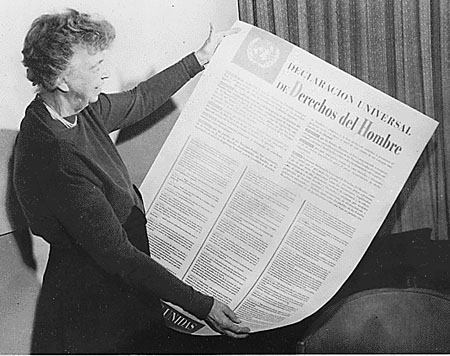If you had taken some of my other history courses, then you would have noted the prominence given to the issue of human rights in both HIS 112 (History of World Civilization II) and HIS 102 (History of Western Civilization II). In HIS 112 my week 13 assignment, which used to be the final exam essay, is now:
Read the Universal Declaration of Human Rights (along with the document background notes and the study questions) and answer the following question in a paragraph:
How has the Universal Declaration of Human Rights (1948) influenced political events in the world since its adoption?
I also note that "The Universal Declaration of Human Rights is available in over three hundred languages.
There is also an explanation on that website of how the Declaration was drafted."
In HIS 102, I also focus on human rights in a similar manner. This is the essay question ofn the HIS 102 final exam:
The essay question for the HIS 102 final exam, approximately two-three pages in length, that you will write in the testing lab, is as follows:
How was the Universal Declaration of Human Rights (1948) similar to the Declaration of the Rights of the Russian People (1917), the French Declaration of the Rights of Man (1789), the American Declaration of Independence (1776) and the English Bill of Rights (1688)? (A copy of the UN text will be provided for you. Note that you DO NOT have to focus on the English Bill.)
The reason for essentially ending both courses with an examination of human rights in the contemporary world was to show the "culmination" of the historical development of a conception of human rights that really first emerged at the end of the seventeenth century with the work of John Locke. That realization of that conception is still, however, a work in progress three centuries later.

I found it difficult to find specific images to include in these remarks on human rights. I finally settled on these two immediately below.

Eleanor
Roosevelt, 1884-1962, with the Spanish text of the Universal
Declaration in 1949, is quoted as saying about the UN Declaration of
Rights, "It is not a treaty...[In the future, it] may well become the international Magna Carta."
Source: Wikimedia Commons

The Original Geneva Convention from 1864.
Source: en.wikipedia.org/wiki/Image:Original_Geneva_Conventions.jpg
Is there anything more illogical than the combination of the protection of human rights and the actions of war as expressed in the Geneva Conventions?

There is a continuing struggle in the world to counter prejudices of race and colour and religion and gender and class and age. Indeed, equality and the unfettered enjoyment of human rights have proven to be elusive concepts. The scale of prejudice can run from outright murder to a more subtle forms, such as parking restrictions at a small church. The struggle goes on everywhere around the world, not just in Sudan or Rwanda-Burundi but also in the United States; not just in Pakistan but also in Germany; not just Myanmar (aka Burma) but also Russia; not just Cuba but also the United Kingdom.
At one time when I taught the HIS 135 course on campus, I focused on the struggle for human rights in rather broad terms (I did not cover each area equally.) as:
1. Waged by Race
Throughout
the world, racial conflict continues, and so the
search for racial equality goes on. For those in the United States, the
last half century has witnessed an incredible (and continuing) struggle
for equal
rights. Already early in the century, organizations, such as the
National Association for the Advancement of Colored
People (NAACP, 1910), had formed with the purpose of achieving
equality. The Second World War intensified the drive for
equality, and then the work of Malcolm X (1925-1965) and Martin Luther
King Jr (1929-1968) in the 1960s brought the struggle to the forefront
on events in the US. While the US has continued to work to uphold
the ideas of the Enlightenment and the Founding
Fathers with regard to human rights, there have been other worldwide
figures involved in the struggle such as Nelson Mandela and Bishop
Desmond Tutu.
2. Waged by Women
I again point to the example of the United States. In the
1970s, as
a culmination of the women's movement that had taken shape in the
1960s, an Equal Rights Amendment (ERA) was proposed
for the US constitution. Seemed like such a simple idea at the
time, a
constitutional guarantee that women could obtain equal rights.
It was a pretty short amendment: "Equality
of rights under the law shall not be denied or abridged by the United
States or by any State on account of sex.basically."
Surprisingly, the
amendment failed to be adopted. The rationale against the
amendment was strange, such as
the argument that women did not need a
guarantee because they were already covered by the constitution.
Opponents
also claimed that passage of the ERA would have far-reaching
implications, such as obliterating traditional distinctions between the
sexes or removing protections for women that were already in force at
the time, such as labor laws in heavy industry.
One of the pioneers in the movement for women's rights was Simone de Beauvoir (1908-1986), a French existentialist who is often considered the founder of modern feminism. Her book La Deuxième Sexe (The Second Sex, 1949) enjoyed a huge success. In it she analyzed why women have second-rate status and no legal equality. Beauvoir later advocated that feminists must be against any inequality of class, race, religion or gender.
It still remains especially dangerous for women to be involved in the political process throughout the world today--witness the 2007 events in Pakistan. There have been very, very few chiefs-of-state (none in the United States, one in Great Britain, one in Germany, none in Russia, none in China, etc).
3. Waged by Class
This is still a problem, especially in Europe, but it is a problem that is
often overlayed by the issue of race as with Turks in Germany or
Hispanics in the US. In much of the world outside
of Western Europe, there are few guarantees of the rights of workers, and
even in the United States there are strict limits on some activities of
the working class.
4. Waged by Youth
Students
became a force everywhere in the 1960s, especially 1968-69 (US, Germany, Britain,
Italy, France) when student activism reached an unprecedented
scale--never to really be duplicated again in Western Europe or the
United States. Youth criticized military, imperialist, colonial, bourgeois
values of political regimes and argued for full
political and civil rights.
3. Waged by the Aged
The
aged face real problems in the United States; they face equally
daunting problems throughout the world, especially where there are few
resources for their care and welfare.
I'm sure that you could come up with some others areas involving aspects of human rights. Take a few moments when you have the chance to consider the status of human rights around the world

There are many international organizations that focus on the protection of human rights. Two of the major non-governmental organizations are Amnesty International (founded in 1961 by Peter Benenson, an English lawyer, with chapters in over forty countries) and the Human Rights Watch (started in 1978 as the Helsinki Watch group to monitor compliance of the Soviet bloc with the provisions of the Helsinki Accords). But take a look at the long list of human rights groups compiled by the University of Minnesota's Human Rights Library, NGO Links. I found that just the length of this list itself clearly symbolized the enormity of the problem of securing human rights for everyone.
Of course the United Nations is also involved with human rights, especially the office of the United Nations High Commissioner for Human Rights. See also the UN resource page on Human Rights.

Well, now that I've written all this, what about a definition of human rights? Here are some sources to look at:
- Human Rights (Stanford Encyclopedia of Philosophy)
- Human Rights: Definition and Much More from Answers.com
- See this interesting commentary, Dear Clarence Thomas: It Happened on July 4, 1776
- Does the Universal Declaration of Human Rights Matter
After I wrote these remarks, it occurred to me that some of you might wonder why Human Rights and Democratization appear as two distinct subjects in my course on contemporary history. Does one have to accompany the other, or can you have one without the other? Something for you to think about.

HIS 135 web pages relevant to human rights
- United Nations
- Nuremberg War Crimes
- Watts
- Martin Luther King, Jr.
- There are many others.

Some suggestions for further research